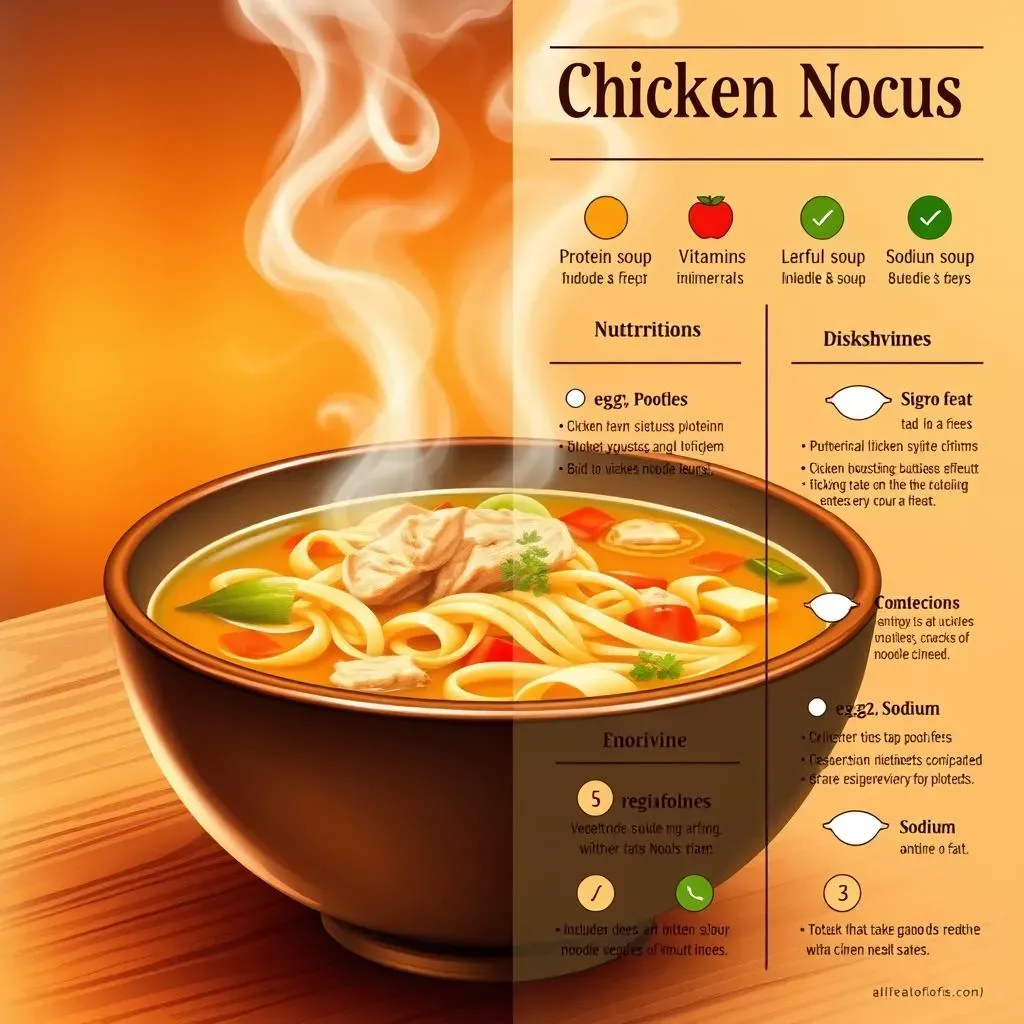Table of Contents
Ever find yourself reaching for a bowl of chicken noodle soup when you're feeling under the weather? It's like a warm hug in a bowl, right? But have you ever stopped to wonder, "is chicken noodle soup healthy?" We all know it tastes good, but is it actually good for us? That's what we're going to unpack today. We'll look past the cozy vibes and examine the real nutritional value, or lack thereof, in this classic dish. Think of this article as your guide to figuring out if your go-to comfort food is also a health booster. We'll check out the good, the not-so-good, and how to make it even better. So, grab a spoon, and let's get to the bottom of the bowl – is chicken noodle soup healthy, or just a tasty myth?
Chicken Noodle Soup: Is It Really That Healthy?

Chicken Noodle Soup: Is It Really That Healthy?
The Comfort Food Question
Okay, so we all have those memories of chicken noodle soup being the ultimate cure-all. You’re sick? Chicken noodle soup. Feeling sad? Chicken noodle soup. It's practically a food hug. But let's be real, just because something makes us feel good doesn't automatically mean it's healthy. The question we are really asking is: does this beloved soup actually offer any real nutritional benefits, or are we just comforted by the warm, salty broth?
The truth, like most things, is a bit more complex than a simple yes or no. A lot of the health factor depends on what you put into it. A homemade version packed with veggies and lean chicken is going to be way different than a canned soup with a ton of sodium and questionable ingredients. So before we label it a superfood or a nutritional disaster, let's break down what's really going on inside that bowl.
Homemade vs. Store-Bought
Think of it like this: a home-cooked meal is like a carefully crafted piece of art, while a canned soup is more like a mass-produced poster. Both have the same general idea, but the details are worlds apart. Canned soups often contain high levels of sodium, preservatives, and sometimes even added sugars. They're designed for convenience and shelf life, not necessarily your well-being.
Homemade versions, on the other hand, allow you to control every single ingredient. You choose the chicken, the vegetables, and how much salt goes in. This control gives you the power to make it a genuinely healthy meal, packed with nutrients and flavor, and without the unnecessary additives. So, when we talk about the health of chicken noodle soup, the "where" it comes from is just as important as the "what" it contains.
Factor | Homemade | Store-Bought |
|---|---|---|
Sodium | Controllable, typically lower | High, often excessive |
Preservatives | None | Often present |
Ingredients | Fresh, whole foods | May contain processed ingredients |
Nutrient Density | Higher, customizable | Lower, less variety |
The Good Stuff: What Makes Chicken Noodle Soup Potentially Healthy

The Good Stuff: What Makes Chicken Noodle Soup Potentially Healthy
The Power of Protein and Broth
Alright, let's talk about the good stuff, shall we? First off, chicken itself is a fantastic source of lean protein. Protein is essential for building and repairing tissues, keeping you feeling full, and supporting your immune system. When you're feeling under the weather, having a good dose of protein can make a real difference. Then there's the broth, the unsung hero of chicken noodle soup. A good, well-made broth is packed with electrolytes, which help with hydration, and it's also easy on your stomach when you're not feeling your best. It's like a gentle, nourishing liquid hug for your insides.
And don't forget about the potential benefits of a slow-simmered bone broth. Bone broth, which is often used as a base for chicken noodle soup, can be rich in collagen and amino acids. While more research is needed, some studies suggest these can support joint health and reduce inflammation. So, that bowl of soup might be doing more for you than just soothing a sore throat.
Veggies and Their Vitality
Now, let's not forget the veggie squad! Carrots, celery, and onions, the usual suspects in chicken noodle soup, are all nutritional powerhouses. Carrots are packed with Vitamin A, which is great for your vision and immune system. Celery provides you with Vitamin K, important for blood clotting and bone health, while onions offer antioxidants that can help fight inflammation. These veggies aren't just there for flavor; they're contributing a host of vitamins and minerals to the party.
The best part? You can customize your soup with any vegetables you enjoy. Throw in some spinach for extra iron, some peas for added fiber, or even some mushrooms for a boost of Vitamin D. The possibilities are endless, and every veggie you add increases the nutritional value. It's like building your own personalized health potion, one delicious spoonful at a time.
Nutrient | Benefits | Found In |
|---|---|---|
Protein | Tissue repair, satiety, immune support | Chicken |
Electrolytes | Hydration, fluid balance | Broth |
Vitamin A | Vision, immune function | Carrots |
Vitamin K | Blood clotting, bone health | Celery |
Antioxidants | Fight inflammation | Onions |
The Comfort Factor Matters Too
It's not all about the vitamins and minerals, though. There's a psychological benefit to chicken noodle soup as well. The warmth, the familiar taste, and the association with care and comfort can all play a role in making you feel better when you're not at your best. Sometimes, that mental boost is just as important as the physical one. It's the food equivalent of a warm blanket and a kind word.
So, when we look at the good stuff, we see that chicken noodle soup, especially when homemade with lots of love and fresh ingredients, can offer a good amount of protein, hydration, vitamins, and that all-important comfort factor. It's a reminder that food can nourish not just our bodies, but our souls, too. It's not a miracle cure, but a little bit of goodness in a bowl.
The NotSoGood: Potential Downsides of Chicken Noodle Soup

The NotSoGood: Potential Downsides of Chicken Noodle Soup
Sodium Overload: The Canned Soup Trap
Okay, so we've talked about the good stuff, but let's face it, chicken noodle soup isn't always a health hero. One of the biggest problems, especially with store-bought and canned options, is the massive amount of sodium. Manufacturers often load up their soups with salt to enhance flavor and preserve them, but this can be a real issue for our health. Too much sodium can lead to high blood pressure and other health problems. It’s like they're trying to give our taste buds a party while our bodies are silently protesting.
Think about it: you're reaching for a "comfort" food, and instead, you're getting a sodium bomb. It's a bit of a sneaky move, isn't it? And the worst part is, you might not even realize how much sodium you're consuming. It all adds up, especially if you're eating canned soup regularly. So, while that warm, salty broth might feel good going down, it's essential to be aware of the sodium content and choose options wisely.
Hidden Ingredients and Lack of Balance
Beyond the sodium, there are other potential downsides to consider. Many canned soups contain artificial flavors, preservatives, and other additives that aren't exactly doing your body any favors. These ingredients can sometimes cause digestive issues or allergic reactions in some people. It's like a hidden landmine of unnecessary chemicals lurking in your seemingly innocent bowl of soup. And let's not forget that some canned soups lack a good balance of nutrients. You might get some protein and a few veggies, but you're not getting the full spectrum of vitamins and minerals that your body needs. It's like a one-hit-wonder, providing a little bit of something but not the complete nutritional package.
Also, let’s be real, the noodles in many soups are often refined carbohydrates, which can cause a quick spike in blood sugar and leave you feeling hungry again soon after. It's like a fleeting sugar rush, leaving you wanting more, and it's not exactly the kind of energy you need for the long haul. So, while chicken noodle soup can be a comforting option, it's important to be aware of these potential downsides and make informed choices. It’s not about demonizing the soup itself, but about being a savvy consumer and knowing what you're putting into your body.
Potential Downside | Details |
|---|---|
High Sodium | Can lead to high blood pressure and other health issues, especially in canned soups. |
Artificial Additives | May cause digestive issues, allergic reactions, and lack of nutritional value. |
Refined Carbs | Noodles can cause blood sugar spikes and leave you feeling hungry again quickly. |
Lack of Balance | May not provide a full spectrum of vitamins and minerals. |
Making Chicken Noodle Soup Healthier: Tips and Tricks

Making Chicken Noodle Soup Healthier: Tips and Tricks
Control the Sodium
Okay, so you're on board with making chicken noodle soup healthier, that's great! One of the easiest things you can do is control the sodium. That means ditching the canned stuff and making it at home. When you make it yourself, you're the boss of the salt shaker. Start by using low-sodium or no-salt-added chicken broth. You can even make your own broth from scratch, which is a great way to control all the ingredients. When you're seasoning, go easy on the salt and try to use herbs and spices instead. Things like garlic powder, onion powder, thyme, and rosemary can add a ton of flavor without the extra sodium. It's all about being a bit more thoughtful about how you're seasoning your soup.
Another simple trick is to add some acid to your soup. A squeeze of lemon juice or a splash of apple cider vinegar can brighten up the flavors and make it taste less bland, so you don't feel the need to add as much salt. It's like a little flavor magic trick. Remember, it's not about cutting out sodium completely, but about being smart about how much you're adding. A little goes a long way, and your body will definitely thank you for it.
Boost the Veggie Power
Ready to take your soup to the next level? Let's talk veggies! Don't just stick to the usual carrots and celery. Get creative! Throw in some spinach or kale for extra vitamins, some bell peppers for a pop of color and flavor, or even some broccoli for added fiber. You can use fresh or frozen veggies, whatever is easiest for you. The more veggies you add, the more nutrients and fiber you're packing into your bowl. It's like a delicious way to eat your vitamins.
And don't be afraid to experiment. Try adding some mushrooms for a meaty texture, some zucchini for a mild flavor, or even some sweet potatoes for a touch of sweetness. The possibilities are endless, and it's a great way to use up any veggies you have in your fridge. Think of your soup as a blank canvas, and veggies are your colorful paints. Every addition makes it more vibrant and nutritious. It's all about making the most of your soup and giving your body a healthy boost.
Tip | How to Implement |
|---|---|
Use low-sodium broth | Choose no-salt-added or low-sodium options at the store or make your own broth. |
Season with herbs and spices | Use garlic powder, onion powder, thyme, rosemary, etc. instead of salt. |
Add acid | Squeeze in lemon juice or add a splash of apple cider vinegar. |
Load up on veggies | Include spinach, kale, bell peppers, broccoli, mushrooms, zucchini, etc. |
